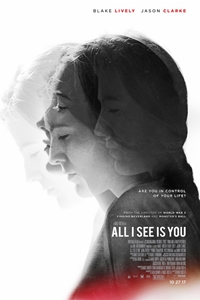All I See Is You (R) ★★
 It's not entirely clear when All I See Is You slides into a fog but it definitely happens. Is it because of all the hyper-stylized camera work that might have been okay in small doses but gradually becomes distracting and then downright irritating? Is it when the film's sluggish narrative momentum grinds to a halt? Is it when, with the climax approaching, the screenplay amps up the melodrama in a story that previously was low-key? Regardless, despite an interesting premise and a promising first act, All I See Is You ultimately fails to deliver much beyond a gradual descent into disinterest and watch-checking.
It's not entirely clear when All I See Is You slides into a fog but it definitely happens. Is it because of all the hyper-stylized camera work that might have been okay in small doses but gradually becomes distracting and then downright irritating? Is it when the film's sluggish narrative momentum grinds to a halt? Is it when, with the climax approaching, the screenplay amps up the melodrama in a story that previously was low-key? Regardless, despite an interesting premise and a promising first act, All I See Is You ultimately fails to deliver much beyond a gradual descent into disinterest and watch-checking.
The director is Marc "Don't Pigeonhole Me" Forster and his leading lady is Blake "Don't Pigeonhole Me, Either" Lively. Forster has helmed the Oscar-recognized Monsters Ball, the wonderfully weird comedy/fantasy Stranger Than Fiction, the Bond adventure Quantum of Solace, and the zombie-fest World War Z. All I See Is You is different in tone and intent from any of those but, considering Forster's flexibility, it can't be considered a "change of pace." Lively also likes playing in different genres. All I See Is You comes on the heels of her time-traveling romance The Age of Adeline and her kick-shark-ass adventure The Shallows. The other major participant is Jason Clarke, who plays Lively's husband. Clarke shows some range here, starting out as a nice-seeming, supportive guy before graduating first to a stick-in-the-mud then to a full-on creep.
When the movie opens, Gina (Lively) is happily married to James (Clarke). They live in Thailand (presumably because that locale is deemed more exotic than, say, Brooklyn). Gina, blind for about 20 years as a result of a childhood car accident that killed her parents, learns from a doctor (Danny Huston) that an operation could restore sight in one eye. She agrees to the surgery and, in its immediate aftermath, the couple is thrilled. But a dark side emerges. Reality doesn't match how Gina imagined things would look and, as she adjusts to life as a seeing person, she is gripped by a sense of melancholia. James, on the other hand, realizes that the "new Gina" is not the wife he had grown comfortable with. This woman is more independent and free-spirited. She no longer relies on him for everything. She shows a predilection for kinky sex and adventures, neither of which interest him. He comes to the conclusion that "they" (meaning "he") were happier when she was blind and he begins to ponder whether there might be a way for them to return to that state.
All I See Is You is presented (literally) from Gina's perspective. Forster overdoes it with the point-of-view shots that feature blurry images and colored lights. (I have heard that colored lights are a symptom of a migraine…) A flash or two of this might have worked but it is overused. Likewise, we understand early that Gina lost her sight and her parents in a car crash in a tunnel in Spain, yet the movie regurgitates this memory repeatedly, as if we're likely to forget it.
The movie perks up during the operation's aftermath. The screenplay and actors do a good job portraying the shifting emotions that accompany this life-altering occurrence. Some, like Gina having difficulty coping with surroundings that don't match the images she had created in her imagination, are expected. Others, like James' jealousy of the freedom and independence sight imparts to her, are not. Had the movie explored these elements better (and with more energy), All I See Is You might have settled into an effective groove. Unfortunately, the story decides to take a lurid turn into B-grade psychological thriller material without bothering to worry about the "thrill" part of the equation. The grand finale is laughably absurd.
Had I not appreciated Forster's previous work, I wouldn't have been disappointed by what he accomplishes (or fails to accomplish) here. The story is pregnant with possibilities and the actors are committed to their roles (Lively, for example, does an excellent job with the scenes in which her character is blind) but the sluggish pacing and general lack-of-energy creates an impatience that's exacerbated by the screenplay's final act artifice. Blind to its missteps, the movie stumbles into a darkness from which it never escapes.
© 2017 James Berardinelli
To get the full Quicklook Films experience, uncheck "Enable on this Site" from Adblock Plus
box office top 10

Civil War Released: April 12, 2024 Cast: Kirsten Dunst, Wagner Moura 11.1M

Abigail Released: April 19, 2024 Cast: Melissa Barrera, Dan Stevens 10.2M

Godzilla x Kong: The New Empire Released: March 29, 2024 Cast: Rebecca Hall, Brian Tyree Henry 9.5M

The Ministry of Ungentlemanly Warfare Released: April 19, 2024 Cast: Henry Cavill, Eiza Gonzalez 9M

Spy x Family Code: White Released: April 19, 2024 Cast: Takuya Eguchi, Saori Hayami 4.9M

Kung Fu Panda 4 Released: March 8, 2024 Cast: Jack Black, Viola Davis 4.6M

Ghostbusters: Frozen Empire Released: March 22, 2024 Cast: Paul Rudd, Carrie Coon 4.4M

Dune: Part Two Released: March 1, 2024 Cast: Timothée Chalamet, Rebecca Ferguson 2.9M

Monkey Man Released: April 5, 2024 Cast: Dev Patel, Sikandar Kher 2.2M

The First Omen Released: April 5, 2024 Cast: Nell Tiger Free, Bill Nighy 1.7M






